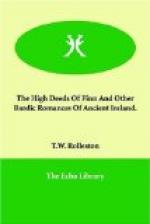In the Heroic Cycle it appears in the longing cry for return to Ireland of Naisi and his brothers, which drives them out of Alba to their death; but otherwise it is rarely expressed. In the Fenian Cycle it exists, not in any clear words, but in a general delight in the rivers, lakes, woods, valleys, plains, and mountains of Ireland. Every description of them, and of life among them, is done with a loving, observant touch; and moreover, the veil of magic charm is thrown over all the land by the creation in it of the life and indwelling of the fairy host. The Fianna loved their country well.
When Christianity came, this deep-set sentiment did not lessen. It grew even stronger, and in exile it became a passion. It is illustrated by the songs of deep regret and affection Columba made in Iona, from whose rocky shores he looked day after day towards the west while the mists rose over Ireland. One little story of great beauty enshrines his passion. One morning he called to his side one of his monks, and said, “Go to the margin of the sea on the western side of our isle; and there, coming from the north of Ireland, you will see a voyaging crane, very weary and beaten by the storms, and it will fall at your feet on the beach. Lift it up with pity and carry it to the hut, nourish it for three days, and when it is refreshed and strong again it will care no more to stay with us in exile, but to fly back to sweet Ireland, the dear country where it was born. I charge you thus, for it comes from the land where I was born myself.” And when his servant returned, having done as he was ordered, Columba said, “May God bless you, my son. Since you have well cared for our exiled guest, you will see it return to its own land in three days.” And so it was. It rose, sought its path for a moment through the sky, and took flight on a steady wing for Ireland. The spirit of that story has never died in the soul of the Irish and in their poetry up to the present day.
Lastly, as we read these stories, even in a modern dress, an impression of great ancientry is made upon us, so much so that some scholars have tried to turn Finn into a mythical hero—but if he be as old as that implies, of how great an age must be the clearly mythic tales which gather round the Tuatha de Danaan? However this may be, the impression of ancientry is deep and agreeable. All myths in any nation are, of course, of a high antiquity, but as they treat of the beginning of things, they




